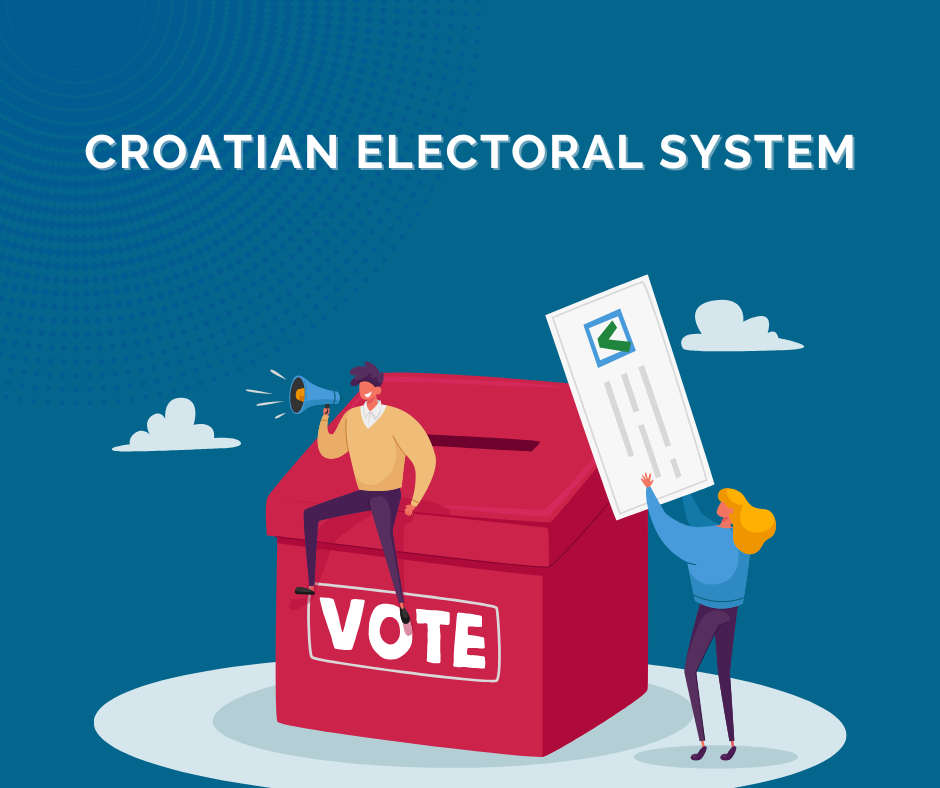
Members of the Croatian Parliament are elected in direct elections, by secret ballot, for a term of four years, by proportional representation and preferential voting.
Voters can only vote for one list of candidates and/or mark on the ballot one candidate who has an advantage over the other candidates on the list they voted for (preferred vote).
Croatia has a proportional electoral system, which means that a party or an independent list receives a certain number of representatives in the parliament in proportion to the number of votes in the elections.
Croatia is divided into 10 constituencies that do not fully coincide with the administrative division of the country. There is also an 11th constituency in which all Croatian citizens who do not reside in the Republic of Croatia vote (meaning those who live in Bosnia and Herzegovina, Germany, Canada and other countries). All constituencies have roughly the same number of male and female voters, which ensures that each vote counts equally. Representatives of national minorities in special constituencies are also elected. (Amendments to the Law on Electoral Units were presented in May 2023, and a public debate on the amendments to the law is currently underway. The new law should enter into force on October 1, 2023.)
In the elections, electoral lists with 14 candidates compete.
The electoral threshold (prohibitive clause) is 5%, which means that not a single list that did not receive a minimum of 5% of the votes is included in the distribution of mandates, that is, it cannot receive a single representative.
Votes are converted into mandates using the D’Hondt method. D’Hondt’s method is one of the most famous ways of converting votes into mandates, and it involves dividing the number of votes received by individual lists by a series of divisors, and mandates are assigned according to the highest numbers/coefficients. The sequence of divisors is 1, 2, 3, 4, 5, … up to the number 14.
A total of 140 representatives are elected in 10 constituencies, in the 11th constituency at least 1 and at most 14, and 7 representatives of national minorities are elected.
The Law on Elections of Representatives to the Croatian Parliament specifically defines the method of electing representatives of national minorities and representatives of the 11th constituency. For representatives and minority representatives, individual candidates run, while the number of representatives of the 11th constituency depends on the number of voters who went to the polls in Croatia.
The right to vote, the right of citizens to vote and be elected, that is, to vote on recall, in a referendum, etc. The right to vote is active and passive. Active suffrage implies the right of citizens to elect their representatives to representative bodies. Universal suffrage is an achievement of democracy, by which various censuses (property, education, residence, sex) were abolished. Active suffrage is acquired by reaching a certain age, usually 18. Passive suffrage is the right of citizens themselves to be elected to representative bodies.
Active suffrage
Every adult citizen of the Republic of Croatia has the right to vote in all elections in Croatia, except the ones deprived of business capacity. It is the right and duty of voters to vote in elections
once and secretly. No one can ask the voter to announce their voting decision, and no one can be
called to account for voting or not voting.
In order to be able to exercise your right to vote at the polling station, you must be registered in the electoral roll and present an identity card. After the members of the electoral commission determine your right to vote, you will receive a ballot on which all candidate lists are printed. Secrecy of voting must be ensured at the polling station. In order for your vote to be valid, you must circle the serial number in front of the name list or serial number of the candidate you want to vote for. After voting, you insert your ballot into the ballot box.
Passive suffrage
Any adult citizen can become a candidate in the elections of the Republic of Croatia, except the ones deprived of business capacity, and in elections for local and regional self-government, the candidate must have registered residence in the territory of the municipality, city and county for which the representative body is running.
In the Croatian electoral legislation, in elections for local and regional representative bodies and
the parliament competes through candidate lists. Lists can be proposed by political parties or citizens and citizens themselves (so-called independent lists). The final number and composition of candidate lists are published by the State Election Commission committee no later than 16 days after the announcement of the election.
Source:
Šalaj B. 2009. Politička pismenost: demokracija i aktivno građanstvo. Obje strane demokracije. Zagreb, Croatia. Centar za edukaciju, savjetovanje i istraživanje. Retrieved from: https://www.cesi.hr/wp-content/uploads/2021/09/obje_strane_demokracije.pdf